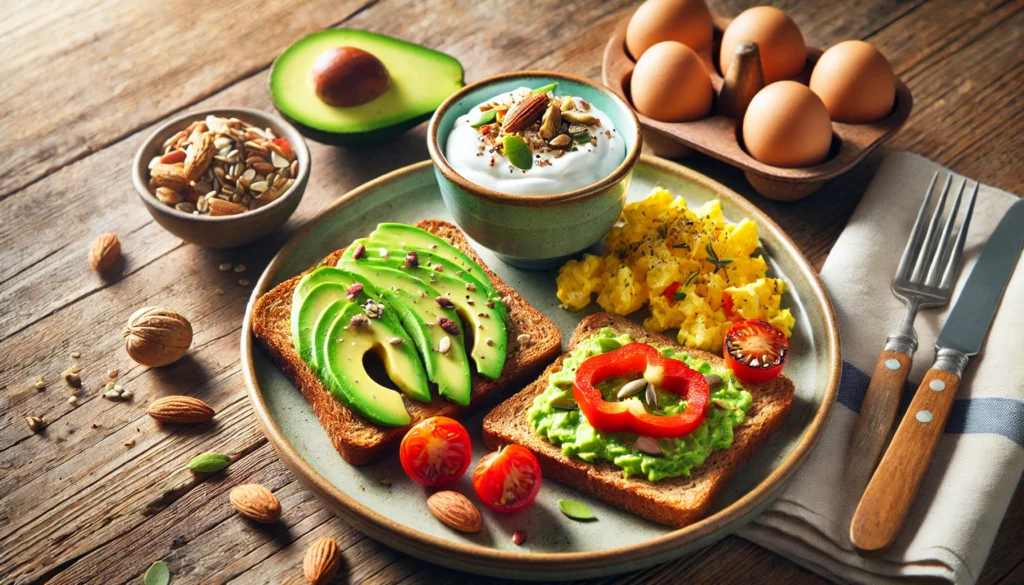In the pursuit of academic excellence, students often overlook one of the simplest yet most powerful tools at their disposal: a nourishing breakfast. A well-balanced breakfast can significantly impact cognitive performance, concentration, and memory, which are critical when preparing for and taking exams. Understanding what constitutes an optimal breakfast for exam day can provide a competitive edge, turning the tide in favor of success. This article will delve deeper into the science, practical suggestions, and future trends related to breakfast and its impact on brain function.
You may also like: Best Foods for Sharp Mental Focus
The Science Behind Breakfast and Brain Function
The connection between breakfast and brain function has been well-documented through various studies, which highlight the influence of morning nutrition on cognitive processes. Essentially, the brain requires a steady supply of glucose, its primary energy source, to function effectively. After an overnight fast, glucose levels are at their lowest, making breakfast crucial in replenishing these levels to fuel the brain.
The Biological Necessity of Breakfast
Breakfast serves as a vital meal that breaks the overnight fasting period, replenishing glucose levels to boost energy and alertness. This meal kick-starts metabolism, helping the body burn calories throughout the day. The biological necessity of breakfast is underscored by its role in maintaining steady glucose levels, which is essential for cognitive and physical performance.
Glucose and Cognitive Performance
Glucose is fundamental in supporting brain activities like memory recall, attention, and problem-solving. A study published in the journal Physiology & Behavior demonstrated that children who consumed breakfast performed better on cognitive tasks than those who skipped it. The findings suggest that breakfast consumption is directly linked to improved cognitive performance, emphasizing its importance before an exam. Moreover, glucose’s role is especially vital in the morning when the body needs to replenish its stores for optimal brain function.
The Impact of Skipping Breakfast
Skipping breakfast can lead to a range of negative outcomes, including decreased attention span and memory recall. Studies show that individuals who skip breakfast often experience fatigue and mood swings, which can hinder academic performance. Additionally, skipping breakfast can lead to overeating later in the day, causing further disruptions in energy levels and cognitive function.
Macronutrients for Mental Clarity
It’s not just about eating any breakfast; the composition of the meal matters. A balanced breakfast rich in complex carbohydrates, proteins, and healthy fats can stabilize blood sugar levels and provide sustained energy. This macronutrient blend is essential for maintaining mental clarity and focus throughout the exam. Each macronutrient plays a specific role: carbohydrates provide energy, proteins support neurotransmitter synthesis, and healthy fats are crucial for brain health.

Best Foods to Eat Before an Exam
Now that we understand the importance of a good breakfast, let’s delve into specific foods that can enhance test performance. Here are some of the best foods to eat before an exam:
Oatmeal: The Slow-Release Energy Source
Oatmeal is a powerhouse of complex carbohydrates, providing a slow and steady release of glucose into the bloodstream. This gradual energy release helps sustain concentration and endurance during a lengthy exam. Top your oatmeal with a handful of berries for added antioxidants and vitamins. Oatmeal’s fiber content also aids in digestion, ensuring that you feel full and focused throughout the morning.
Eggs: Protein-Packed Brain Boosters
Eggs are an excellent source of high-quality protein, which is vital for neurotransmitter production. They contain choline, a nutrient essential for brain health and memory. Scramble them with spinach and tomatoes for a nutrient-dense breakfast that supports cognitive function. The versatility of eggs allows for various preparations, from omelets to boiled eggs, making them a convenient option for busy mornings.
Greek Yogurt: Probiotic-Rich for Gut-Brain Health
Greek yogurt is not only rich in protein but also contains probiotics that promote gut health. Emerging research suggests a link between gut health and brain function, making probiotic-rich foods like Greek yogurt a beneficial addition to your exam day breakfast. Consider adding nuts and seeds to your yogurt to enhance its nutritional value, providing additional fiber and omega-3 fatty acids.
Bananas: Quick and Convenient Brain Fuel
Bananas are a convenient source of carbohydrates, potassium, and vitamin B6. These nutrients contribute to improved mood and cognitive performance. Pair a banana with a tablespoon of almond butter for a satisfying and brain-boosting snack. The natural sugars in bananas provide a quick energy boost, while their fiber content ensures a steady release of glucose.
Nuts and Seeds: Omega-3 Rich Enhancers
Incorporating nuts and seeds like walnuts, almonds, and flaxseeds into your breakfast can provide essential omega-3 fatty acids. These nutrients are known for their role in supporting brain health and improving memory. Sprinkle them over oatmeal or yogurt to elevate your breakfast’s nutritional profile.
Foods to Avoid Before an Exam
While certain foods can enhance cognitive performance, others can be detrimental. Avoid these options to ensure optimal brain function:
Sugary Cereals and Pastries
High-sugar breakfast options may offer a quick energy boost but lead to a rapid crash in blood sugar levels, resulting in fatigue and reduced concentration. Opt for whole-grain alternatives instead. The quick energy surge from sugary foods can also increase anxiety and jitteriness, which are counterproductive on exam day.
Processed Meats
Processed meats like sausages and bacon are high in saturated fats and sodium, which can impair cognitive function. Choose lean protein sources like eggs or turkey instead. These meats can also lead to feelings of sluggishness and bloating, further hindering exam performance.
Caffeinated Beverages in Excess
While moderate caffeine consumption can enhance alertness, excessive intake can lead to jitters and anxiety. It’s crucial to monitor caffeine levels and opt for alternatives like green tea, which provides a milder boost without the crash. Over-reliance on caffeine can also disrupt sleep patterns, negatively affecting cognitive function.

Timing and Portion Control
When it comes to breakfast on exam day, timing and portion control are key. Aim to eat at least an hour before the test to allow your body to digest and absorb nutrients. A moderate portion will provide the necessary energy without causing discomfort or lethargy.
Hydration Matters
Staying hydrated is equally important for cognitive function. Dehydration can lead to headaches and reduced concentration. Include a glass of water with your breakfast and continue to hydrate throughout the day. Proper hydration supports blood circulation, ensuring that nutrients reach the brain efficiently.
The Role of Fiber in Satiety
Incorporating fiber-rich foods into your breakfast can aid in satiety, preventing hunger pangs during exams. Foods like whole grains, fruits, and vegetables provide the necessary fiber to keep you full and focused. Fiber also plays a role in stabilizing blood sugar levels, which is essential for maintaining energy.
Listening to Your Body
Understanding your body’s hunger cues is vital for portion control. Eating too much or too little can affect your concentration and energy levels. It’s important to find a balance that suits your individual needs, ensuring that you’re neither hungry nor overly full during the exam.
Historical Context and Current Trends
The emphasis on breakfast as a meal of importance isn’t a new phenomenon. Historical records indicate that ancient Greeks prioritized a morning meal before engaging in intellectual or physical activities. In contemporary times, the focus has shifted towards understanding the nutritional components that best support brain health, leading to a surge in research on breakfast’s impact on cognitive performance.
Ancient Practices and Breakfast
Ancient civilizations often recognized the importance of a morning meal, incorporating it into their daily routines to enhance physical and mental capabilities. These practices laid the foundation for modern breakfast habits, emphasizing the meal’s role in supporting daily functions.
Modern Research and Nutritional Insights
Contemporary research continues to explore the links between breakfast and cognitive performance, identifying specific nutrients that enhance brain function. This research has led to a deeper understanding of how different foods impact memory, attention, and problem-solving abilities, guiding modern dietary recommendations.
The Rise of Brain Foods
Current trends also highlight the growing popularity of “brain foods” and their incorporation into breakfast routines. Ingredients such as chia seeds, flaxseeds, and nuts are becoming staples due to their omega-3 fatty acids, which support brain function. This trend reflects a broader awareness of nutrition’s role in cognitive health.
Future Implications: The Role of Personalized Nutrition
As we look to the future, personalized nutrition is poised to play a significant role in optimizing breakfast for cognitive performance. Advances in genetic testing and nutritional genomics may soon enable tailored dietary recommendations that align with individual metabolic needs, enhancing brain health and exam performance even further.
The Promise of Nutrigenomics
Nutrigenomics, the study of how food interacts with an individual’s genes, holds the potential to revolutionize dietary recommendations. By understanding genetic predispositions, personalized nutrition plans can be developed to optimize brain function and overall health.
Tailored Dietary Recommendations
Future advancements may allow for personalized breakfast recommendations based on individual genetic profiles and lifestyle factors. This approach could enhance cognitive performance by aligning nutrition with specific biological needs, providing a more targeted strategy for exam preparation.
Technology and Dietary Tracking
Emerging technologies, including apps and wearable devices, are facilitating personalized nutrition by tracking dietary intake and providing real-time feedback. These tools can help individuals make informed decisions about their breakfast choices, optimizing their cognitive performance for exams.

Practical Breakfast Ideas for Exam Day
Here are some practical breakfast ideas that incorporate the recommended foods for exam day:
- Oatmeal Delight: Cook a serving of oatmeal and top it with sliced bananas, walnuts, and a drizzle of honey. This combination provides a balanced mix of carbohydrates, healthy fats, and natural sugars, offering sustained energy.
- Egg and Veggie Wrap: Scramble eggs with spinach and bell peppers, and wrap them in a whole-grain tortilla. Add a sprinkle of cheese for extra flavor. This wrap is packed with protein and fiber, supporting brain health and keeping you satisfied.
- Yogurt Parfait: Layer Greek yogurt with mixed berries and granola for a probiotic-rich, satisfying breakfast. The parfait offers a mix of protein, antioxidants, and fiber, promoting gut and brain health.
- Smoothie Bowl: Blend a banana with a handful of spinach, a scoop of protein powder, and a splash of almond milk. Pour into a bowl and top with chia seeds and sliced almonds. This smoothie bowl is nutrient-dense, providing essential vitamins and minerals for brain function.
- Avocado Toast: Spread mashed avocado on whole-grain toast and top with sliced tomatoes and a sprinkle of sesame seeds. Avocado’s healthy fats and fiber make this a brain-boosting breakfast option.
Conclusion
In conclusion, a nourishing breakfast is an essential component of preparing for exam success. By choosing foods that stabilize blood sugar levels, support brain function, and provide sustained energy, you can enhance cognitive performance and increase your chances of acing that test. Remember to consider portion sizes and hydration, and avoid foods that may hinder concentration. With the right breakfast, you’re setting yourself up for a successful exam day. By prioritizing morning nutrition, students can unlock their full academic potential and approach exams with confidence and clarity.
Further Reading:
Can food improve your exam performance?
Brain Foods for Exams: 5 Best Foods to Eat Before a Test
Important Note: The information contained in this article is for general informational purposes only, and should not be construed as health or medical advice, nor is it intended to diagnose, prevent, treat, or cure any disease or health condition. Before embarking on any diet, fitness regimen, or program of nutritional supplementation, it is advisable to consult your healthcare professional in order to determine its safety and probable efficacy in terms of your individual state of health.
Regarding Nutritional Supplements Or Other Non-Prescription Health Products: If any nutritional supplements or other non-prescription health products are mentioned in the foregoing article, any claims or statements made about them have not been evaluated by the U.S. Food and Drug Administration, and such nutritional supplements or other health products are not intended to diagnose, treat, cure, or prevent any disease.


